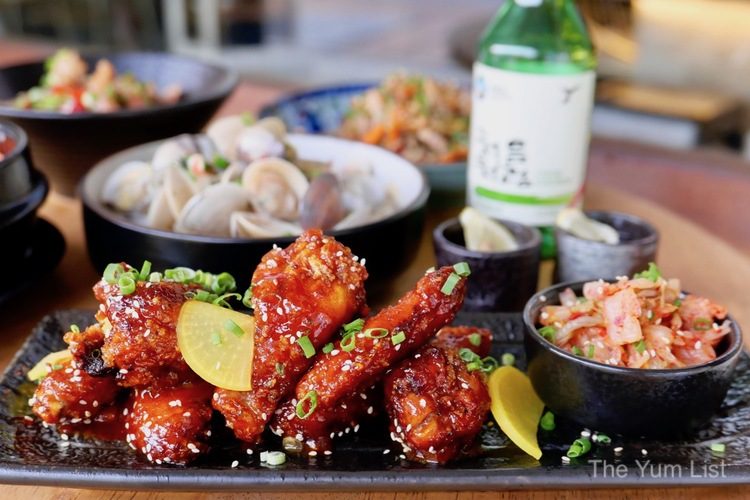Hanjan Eatery Soju Bar
Monica Tindall
On the current “What’s Hot” list in Penang, Hanjan Eatery Soju Bar is gaining quite a reputation. Weekends are packed, and locals are saying it’s best to make a reservation to guarantee a table. Apparently, the key to this Korean restaurant and bar’s rapid success is fast and friendly service backed up by a simple menu of Korean recipes and drinks. We’re here to find out for ourselves what is keeping Penangnites returning.
Hanjan Eatery Soju Bar has a prime position on Lebuh Campbell. Located in the heart of the UNESCO World Heritage site, this street was previously, and infamously, the red-light district. Today it is one of Georgetown’s most famous shopping streets with markets, stores and boutique hotels as neighbours.
The interior is stylish and immediately welcoming with a seven-seater bar as the centrepiece. Gold (in a nod to the shop’s previous history as a gold business) and copper metallics with a mixture of backlighting and pendants create a warm setting. Polished cement walls and wooden tables hone in on complementary natural elements, and a couple of well-placed artworks add just the right amount of cosiness.
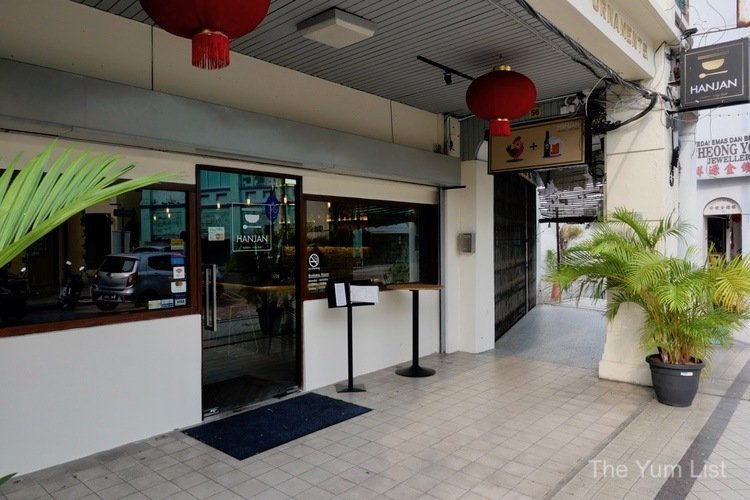
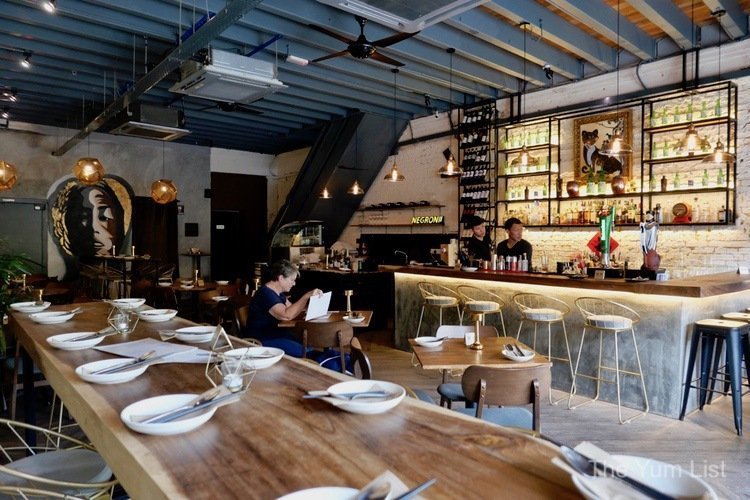
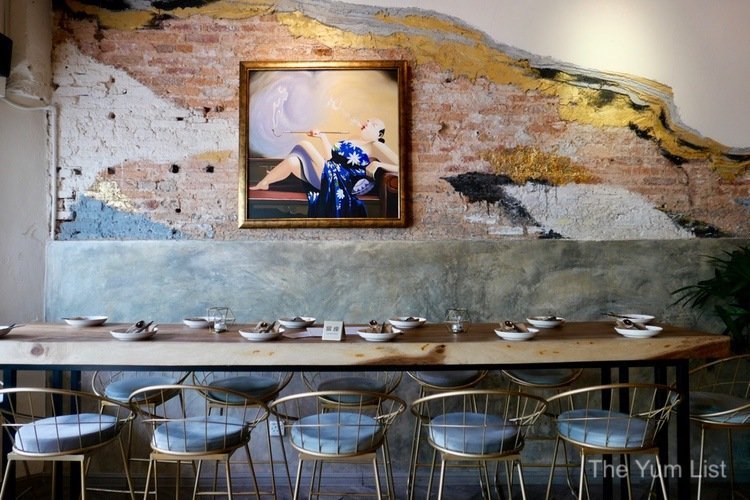
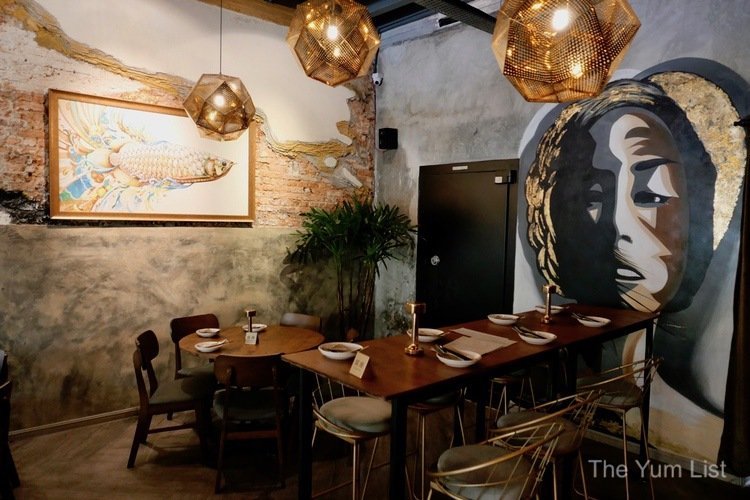
Hanjan Eatery Soju Bar Menu
Korean owner, Sun, greets guests at the door. He is suave and handsome; I bet he has been mistaken for a K-pop star on more than one occasion. Sun helpfully explains Hanjan Eatery Soju Bar’s menu. He says it is a contemporary take on traditional Korean recipes with some Malaysian flavours making an appearance. It is a simple one-pager and easy to navigate. Two sections, Anju (food meant to be eaten with alcohol) and Noodles & Rice, keep choices straightforward.
Bibimbap (RM20), a classic Korean rice dish is a comforting tummy filler. All in one bowl, jasmine rice is topped with assorted vegetables, gochujang (spicy fermented red chilli paste) and topped off with an onsen kampong egg.
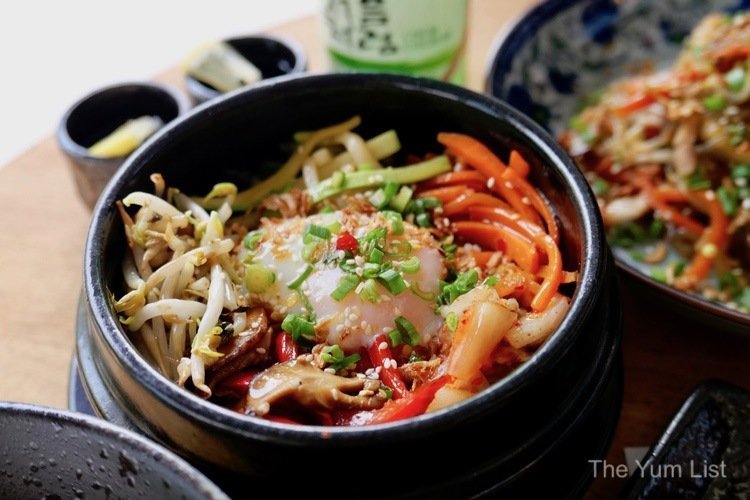
A tasty seafood number is Jogae (RM22). This recipe boasts a generous pile of clams steamed together with garlic, soju and chilli. The sauce is absolutely addictive, making me want to pick up the bowl and drink from the rim.
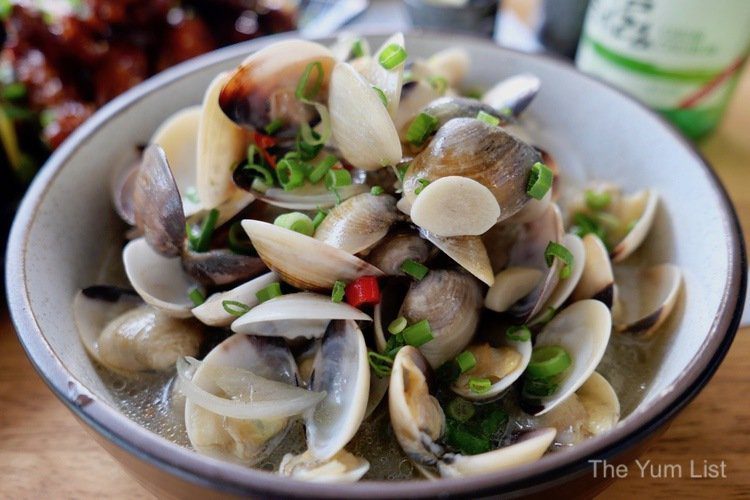
Things get even better at Hanjan Eastery Soju Bar with Japchae (RM22). These sweet potato noodles are stir-fried with strips of zucchini, carrot, shitake mushrooms, bean sprouts and pork belly. Sesame oil, soy sauce and brown sugar make a delicious dressing.
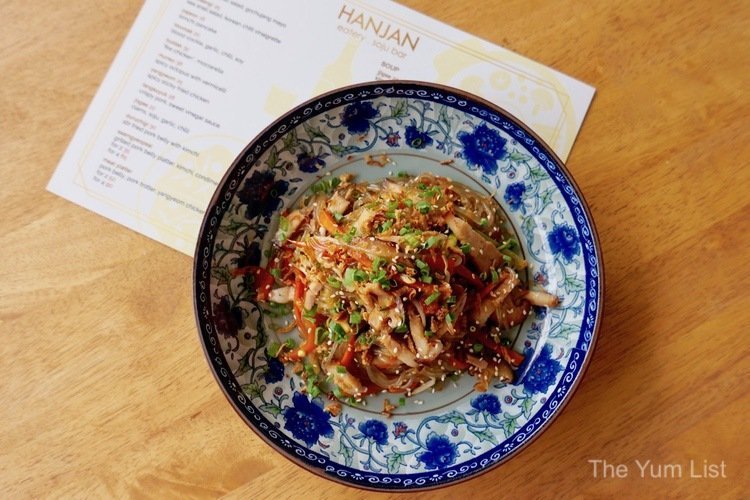
Sun says that Yangnyeom (RM25), or Korean fried chicken, was initially made popular by Korean drama but continues to be so as it is so darn tasty. Double deep-fried, the skin is rich and coated in a seductively sticky sauce. Sesame and vinegar in the marinade provide relief from the richness, enabling us to dig back in for more and more. Definitely a finger food, each piece gets sucked clean to the bone.
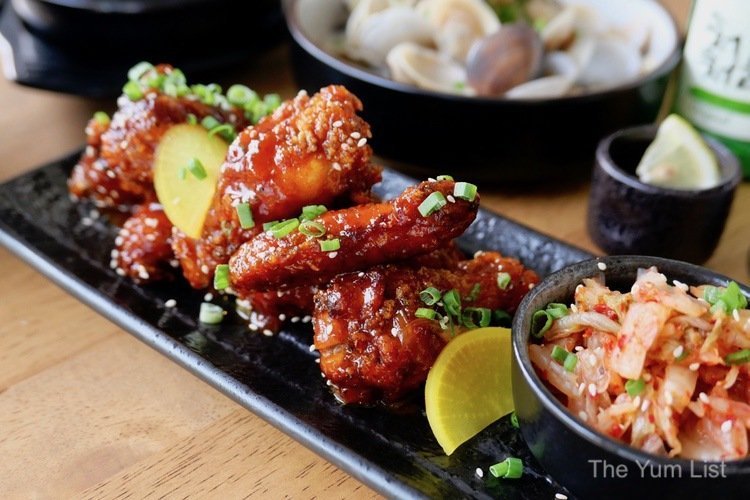
The last dish we manage to squeeze in is Tangsuyuk (RM28), or crispy pork. It’s in a viscous, sweet and acidic sauce. Red capsicum, spring onions, white sesame and caramelized onions add natural fruitiness and texture.
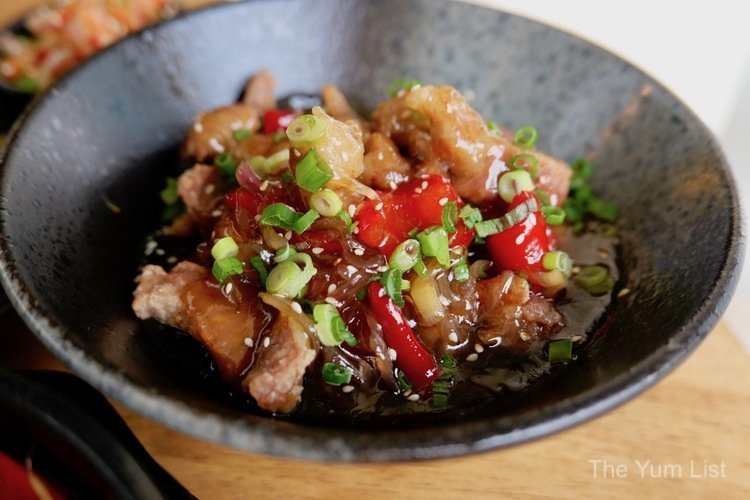
Drinks
To truly eat like a Korean, however, the food must be washed down with soju, and a generous amount of it (if you really want to be authentic).
Otherwise known as Korea’s national drink, soju is a clear distilled beverage with moderate alcohol content (usually around 20%). It was traditionally made with rice, but modern times sees it produced from a variety of grains, with the cheaper versions often based on sweet potatoes. Whatever the category, it is commonplace at a table and a natural counterpart to Korean food.
Hanjan Eastery Soju Bar offers it chilled and neat as is the custom, and also in several cocktails. Soju makes a suitable, lower alcohol replacement for vodka, and the bar team here whip up some real thirst-quenchers ideal for Penang’s tropical heat. Of course, we’re culturally sensitive and obey the custom. Soju served in shot glasses inside a traditional Korean lunch box with ice, and a slice of lemon is a refreshing and welcome mate to the food.
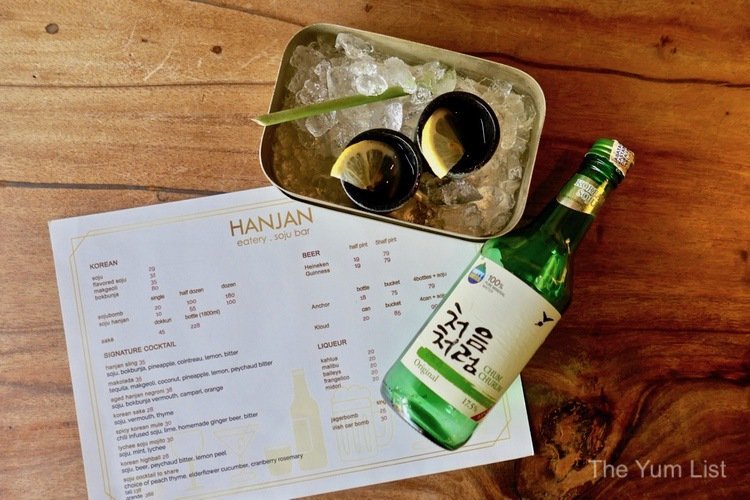
Soju Cocktails
We wouldn’t want to offend though by refusing a contemporary beverage at Hanjan Eastery Soju Bar and so also try out a couple of craft creations.
Aged Hanjan Negroni (RM 38) sounds too good to resist. It’s Hanjan’s special recipe using homemade Korean sweet vermouth, soju aged in an oak barrel on-site, Campari and orange. Served in a rocks glass and garnished with a twist of orange peel, it is a winner!
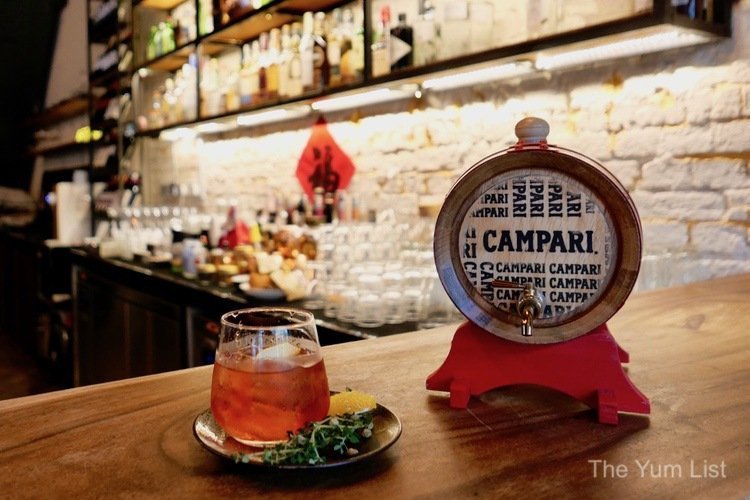
Hubby’s preferences lean more towards the Spicy Korean Mule (RM30), which also comes highly recommended. Chilli-infused soju forms the base. It’s built with lime, homemade ginger beer and bitters. The ginger and spice go well together. A slice of lime and red chilli garnish the top and torched rosemary gives off soft herbaceous aromas.
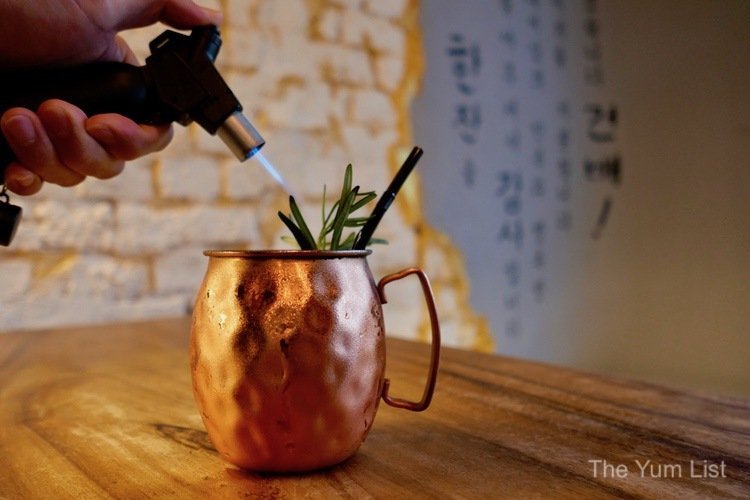
Hanjan Eatery Soju Bar
The team at Hanjan Eatery Soju Bar really have hit the nail on the head with setting, service, food and beverage. A stylish contemporary design is a welcome home for tasty Korean recipes, copious amounts of soju and a fantastic craft cocktail menu to match.
Reasons to visit Hanjan Eatery Soju Bar: all the dishes we tried were extremely flavourful, our favourite dishes though were the Japchae, Yangnyeom and Jogae; do be sure to order soju to wash it down and be tempted by a craft cocktail or two – they are very very good.
Hanjan Eatery Soju Bar
56 Lebuh Campbell
George Town, Penang, Malaysia
www.facebook.com/hanjanpg
+6 013457 0218
Hanjan Eatery Soju Bar Opening Hours
Monday to Saturday: 11 am – 1 am
Find more on Penang’s vibrant culinary scene here and other Georgetown eateries worth a visit here, here, here, here and a fun hidden bar here.

